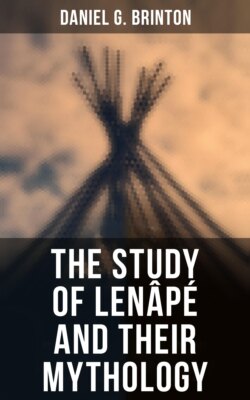Читать книгу The Study of Lenâpé and Their Mythology - Daniel G. Brinton - Страница 20
На сайте Литреса книга снята с продажи.
Derivation of Lenni Lenape.
ОглавлениеTable of Contents
The proper name of the Delaware Indians was and is Lenapé, (a as in father, é as a in mate). Dr. J. Hammond Trumbull[48] is quite wide of the mark both in calling this a "misnomer," and in attributing its introduction to Mr. Heckewelder.
Long before that worthy missionary was born, the name was in use in the official documents of the commonwealth of Pennsylvania as the synonym in the native tongue for the Delaware Indians,[49] and it is still retained by their remnant in Kansas as the proper term to designate their collective nation, embracing its sub-tribes.[50]
The derivation of Lenape has been discussed with no little learning, as well as the adjective lenni, which often precedes it (Lenni Lenape). Mr. Heckewelder stated that lenni means "original, pure," and that Lenape signifies "people."[51] Dr. Trumbull, in the course of a long examination of the words for "man" in the Algonkin dialects, reaches the conclusion that "Len-âpé" denotes "a common adult male," i.e., an Indian man; lenno lenâpé, an Indian of our tribe or nation, and, consequently, vir, "a man of men."[52] He derives these two words from the roots len (= nen), a pronominal possessive, and ape, an inseparable generic particle, "denoting an adult male."
I differ, with hesitation, from such an eminent authority; but this explanation does not, to my mind, give the precise meaning of the term. No doubt, both lenno, which in Delaware means man, and len, in Lenape, are from the pronominal radicle of the first person né, I, we, mine, our. As the native considered his tribe the oldest, as well as the most important of created beings, "ours" with him came to be synonymous with what was esteemed ancient, indigenous, primeval, as well as human, man-like, par excellence. "We" and "men" were to him the same. The initial l is but a slight modification of the n sound, and is given by Campanius as an r, "rhenus, homo."
Lenape, therefore, does not mean "a common adult male," but rather "a male of our kind," or "our men."[53]
The termination apé is said by Heckewelder to convey the idea of "walking or being in an erect posture." A comparison of the various Algonkin dialects indicates that it was originally a locative, signifying staying in a place, abiding or sitting. Thus, in Cree, apú, he is there; in Chipeway, abi, he is at home; in Delaware, n'dappin, I am here. The transfer of this idea to the male sex is seen in the Cree, ap, to sit upon, to place oneself on top, apa, to cover (animate and active); Chipeway, nabe, the male of quadrupeds. Baraga says that for a Chipeway woman to call her husband nin nabem (lit. my coverer, comp. French, femme couverte), is coarse.
